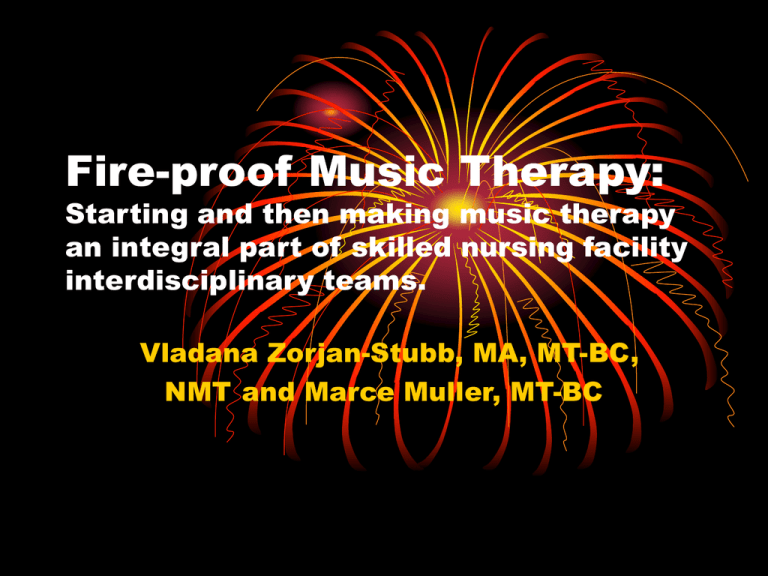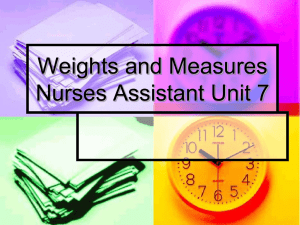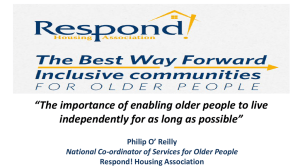Fireproof-MT-with-Skilled-Nursing-by-Marce-Muller
advertisement

Fire-proof Music Therapy: Starting and then making music therapy an integral part of skilled nursing facility interdisciplinary teams. Vladana Zorjan-Stubb, MA, MT-BC, NMT and Marce Muller, MT-BC What do you think? • What is skilled nursing? • What population is being served? • What are their specific needs? • What role can an MT play? • Are there regulations for daily living act? • Tell us what you know! Understanding Skilled Nursing? (from MT clinical perspective) • Identifying needs of facilities • Short-term Rehab • Desire to go home no act involvement • Youngest Res. 32 years old • Long-term Care • Desire to do something interesting; not be bored • Hospice • Young adults & older adults Understanding Title 22 (Understanding Activity Department Requirements) • Daily activity requirements • • • • • • • • • • • • • Exercise Current Events Socializing (“Coffee Socials”) Evening Groups Religious Services Intergenerational Program Special Events Minimum of 5 “Special Days” a month (i.e. Grandparent’s day, Peanut butter Lover’s Day, etc.) Outings in Community Pet Therapy Sensory Stimulation See “Critical Elements for Activities” All regulations reflect what we do as MT’s anyway! Marketing Tips and Ideas • Calling Facilities Activity Directors • Pro Bono Work • Get on their Monthly “Entertainment” Schedule—then EDUCATE! • Sell self—able to include 25+ people in group music session and provide instruments for all—interactive! • Not only entertaining but meeting goals on care plans, completing documentation, assessments • DO NOT ask for anything 1st time—provide own materials • Make face contact with administrator 1st time come, invite to the next music session; invite to see MT at other building 1st Presentation to the Facility of choice—get Hired! • Make appointment with Administrator (Selling Pts) • Know what they’re paying current Activity Director/Entertainers and show what they’re getting for the $ • Show cost-effectiveness—”Competitive Advantage” • Marketing tool—”Marginal Difference”-extra pts will pay for MT in building • More professional way to engage residents • Therapy for 2 hours/day, what about other 22 hours? • Focus sell on Short-term Rehab (revenue) • Find studies to support needs—condense, provide bibliography Findings continued… • MT has shown decrease in depression in residents with Alzheimer’s type dementia • Study showed increased cognitive functioning from day to day in dementia patients who participated in MT (JMT, Winter 2007) • Showed significant increase in positive social behavior and decrease in negative bx (i.e. agitation) with stimulating music in background (JMT, Winter 2007). Continued… • Neglect & abuse—no sensory stimulation • Studies showing brain activity For late stages of dementia • Res facing wall, no TV considered neglect—EDUCATE STAFF • Difference from MT and high school students • Age inappropriate activities • Entertainment based/passive • Unable to complete required documentation—(most important to them) Job Description Activity vs. MT • Activity Director • • • • • • • • Party Planner Weekend certificate High school diploma Entertainment Coordinator Outing Coordinator Games/Movies (Bingo!) Unfamiliar with mental illness Uneducated in engaging residents (doing activities for • Music Therapist • therapeutic approach for traditional activities (Bingo) • Completes required documentation • Meets needs/prevents future problems/declines in functioning—signs of depression, anxiety, hallucination, etc. Pros & Cons of Full-time • Pro’s • Develop therapeutic relationship with residents • Salary/benefits/ paid time off • Daily educating staff/doctors of MT • Con’s • Must perform “Activity Director” duties • No control over schedule • Risk of burn-out • Often times only MT in building-lonely Pros & Cons of Contracted • Pros— • May get paid more per hr • In control of schedule • Planning & Charting on own time (not paid) • Clear cut MT goals/care plan • Cons— • Less time to build relationship • Exhaustion of traveling • Poor support of Activity Director (not implementing goals) • Less time with families • Don’t want to pay You are an Interdisciplinary Team Member! • Care Plans • Care plan must reflect other areas that may affect activity involvement (i.e. dietary, rehab, wound management, etc.) • If resident prefers activities at 8am, CNA’s must have resident ready (Personal Preference) • Part B (Medicare) • Help identify decline of functioning in residents for nursing & Rehab • Social Services • Communicate residents who would benefit visits with psychologist Starting the Music Therapy Program • Department Goals! (long term and short term) • Identify areas of improvement • Create plan of action (include administrator if appropriate) • In-services • Build relationship with DSD • Pick 1 issue/topic and focus on it • Implement staff reward system/training tool Populations Served: Short-term Rehabilitation • Generally… • • • • Don’t want to attend Groups Want to go home Get bored/depressed easily May have cognitive deficits/may not • Care plan in alignment with therapy goals—include therapist Long-Term, HighFunctioning • • • • Use experience from resident Y.K. Feelings of loss of control Easily depressed/bored Resistive to some activities (example Dr. B.) • Give a job in facility • • • • • Resident Council President Greeter Store operator Resident of the Month Residents lead Bible Study Long-term, low functioning • Sensory Stimulation • Examples/Studies • Help staff know when appropriate to bring to activities—example of religious preferences • Keep tabs on functioning—notify when decline occurs • Example of program in process Hospice • Comfort for staff, residents & families affected • Prepare for grieving residents • Refusal of family to do assessment Running the Program Assessments • Initial, quarterly, annual, COC • MDS nurse give calendar of due dates • Generally 5 days to complete • Must match care plan • Include if veteran, voting, religion, occupation, name preference • MDS 3.0 interview—offensive Budget (fundraisers) • Typically around $300/month • Depends on building/occupancy • Bake Sales • Art Gala’s • Garage Sales CALENDAR! • Monthly calendar • Different activity daily • Special events • High & low functioning activities reflected • Religious/Spiritual • Exercise • Socials • Evening Groups • Regulation of # of act per day • Give ways to “get around” it • Revisit Title 22 Volunteers • Get on Volunteer Opportunity Lists—provide job description • • • • • Community Colleges High Schools Girl/Boy Scouts Church Groups AA/Drug Rehab • Make experience exciting/different • Educate on MT Meetings • Resident Care Conference • Organized by SS (IDT) • 1st 1-2 weeks in building • Department Head—daily • Department Meetings with Staff • Resident Council Activity ideas • High Functioning • • • • • • • • • • • Around the World Music via Centuries Each Century Music Music & Art Musical Styles Pictionary Computers Evening Groups Yoga Tai Chi/Chi Gong Brain Quest—4 weeks • High/Low Functioning • • • • • • • • • • • • • Name that Tune Interesting Geography Music of the World Learn an Instrument Improvisation Geography/History/ Trivia/ Massage Singo Relaxation Emotional Ball Getting to Know You Alphabet Soup MDS 3.0 • Questions? • Comments? Insurance Basics • • • • Medicare Medical GNP/Routine Medicare Part B—3 day observation period • HMO Starting Internship Program! • Develop Packet • Include administrator • • • • • Follow guidelines of AMTA Represent at Internship Fair Network with Alumni Understand ALL requirements Set forth very clear expectations Improvements • • • • • • Documentation Getting back with Rehab Sensory Group Internship Development Instruments Personal/Professional Growth • Grad school, Spanish tutor Activities • Geriatric Song List—refer to JMT Miscellaneous • Policies & Procedures • Questions?







